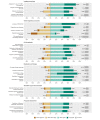Future Medical Artificial Intelligence Application Requirements and Expectations of Physicians in German University Hospitals: Web-Based Survey
- PMID: 33666563
- PMCID: PMC7980122
- DOI: 10.2196/26646
Future Medical Artificial Intelligence Application Requirements and Expectations of Physicians in German University Hospitals: Web-Based Survey
Abstract
Background: The increasing development of artificial intelligence (AI) systems in medicine driven by researchers and entrepreneurs goes along with enormous expectations for medical care advancement. AI might change the clinical practice of physicians from almost all medical disciplines and in most areas of health care. While expectations for AI in medicine are high, practical implementations of AI for clinical practice are still scarce in Germany. Moreover, physicians' requirements and expectations of AI in medicine and their opinion on the usage of anonymized patient data for clinical and biomedical research have not been investigated widely in German university hospitals.
Objective: This study aimed to evaluate physicians' requirements and expectations of AI in medicine and their opinion on the secondary usage of patient data for (bio)medical research (eg, for the development of machine learning algorithms) in university hospitals in Germany.
Methods: A web-based survey was conducted addressing physicians of all medical disciplines in 8 German university hospitals. Answers were given using Likert scales and general demographic responses. Physicians were asked to participate locally via email in the respective hospitals.
Results: The online survey was completed by 303 physicians (female: 121/303, 39.9%; male: 173/303, 57.1%; no response: 9/303, 3.0%) from a wide range of medical disciplines and work experience levels. Most respondents either had a positive (130/303, 42.9%) or a very positive attitude (82/303, 27.1%) towards AI in medicine. There was a significant association between the personal rating of AI in medicine and the self-reported technical affinity level (H4=48.3, P<.001). A vast majority of physicians expected the future of medicine to be a mix of human and artificial intelligence (273/303, 90.1%) but also requested a scientific evaluation before the routine implementation of AI-based systems (276/303, 91.1%). Physicians were most optimistic that AI applications would identify drug interactions (280/303, 92.4%) to improve patient care substantially but were quite reserved regarding AI-supported diagnosis of psychiatric diseases (62/303, 20.5%). Of the respondents, 82.5% (250/303) agreed that there should be open access to anonymized patient databases for medical and biomedical research.
Conclusions: Physicians in stationary patient care in German university hospitals show a generally positive attitude towards using most AI applications in medicine. Along with this optimism comes several expectations and hopes that AI will assist physicians in clinical decision making. Especially in fields of medicine where huge amounts of data are processed (eg, imaging procedures in radiology and pathology) or data are collected continuously (eg, cardiology and intensive care medicine), physicians' expectations of AI to substantially improve future patient care are high. In the study, the greatest potential was seen in the application of AI for the identification of drug interactions, assumedly due to the rising complexity of drug administration to polymorbid, polypharmacy patients. However, for the practical usage of AI in health care, regulatory and organizational challenges still have to be mastered.
Keywords: AI; algorithms; artificial intelligence; clinical decision support; expectation; hospital care; machine learning; physician; requirement.
©Oliver Maassen, Sebastian Fritsch, Julia Palm, Saskia Deffge, Julian Kunze, Gernot Marx, Morris Riedel, Andreas Schuppert, Johannes Bickenbach. Originally published in the Journal of Medical Internet Research (http://www.jmir.org), 05.03.2021.
Conflict of interest statement
Conflicts of Interest: None declared.
Figures






References
-
- Sanchez-Pinto LN, Luo Y, Churpek MM. Big Data and Data Science in Critical Care. Chest. 2018 Nov;154(5):1239–1248. doi: 10.1016/j.chest.2018.04.037. http://europepmc.org/abstract/MED/29752973 - DOI - PMC - PubMed
-
- Guo Y, Hao Z, Zhao S, Gong J, Yang F. Artificial Intelligence in Health Care: Bibliometric Analysis. J Med Internet Res. 2020 Jul 29;22(7):e18228. doi: 10.2196/18228. https://www.jmir.org/2020/7/e18228/ - DOI - PMC - PubMed
-
- Choi E, Bahadori MT, Schuetz A, Stewart WF, Sun J. Doctor AI: Predicting Clinical Events via Recurrent Neural Networks. JMLR Workshop Conf Proc. 2016 Aug;56:301–318. http://europepmc.org/abstract/MED/28286600 - PMC - PubMed
Publication types
MeSH terms
LinkOut - more resources
Full Text Sources
Other Literature Sources

